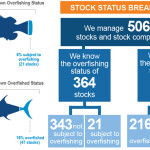Oceana released a report on 12 July that suggests multiple European governments, particularly Italy, are turning a blind eye to illegal, unreported, and unregulated (IUU) fishing in the Mediterranean Sea.
The report, which used data from Automatic Identification Systems (AIS) tracking from Global Fishing Watch (GFW), found suspected cases of bottom trawlers operating in Fisheries Restricted Areas (FRA) and foreign vessels active in waters that potentially qualify as IUU. The biggest offender, Italy, was found to have more than 10,000 hours of illegal fishing activity from Italian-flagged bottom trawler-equipped vessels in the FRA established in the Strait of Sicily.
The area in the Strait of Sicily is designed to protect young hake populations where the stock is already overfished. Trawling in the area is prohibited.
The IUU vessels were discovered using GFW’s fishing detection algorithms. According to Oceana, the actual amount of IUU may be even higher, as some vessels could have either “lacked AIS equipment or have turned off AIS broadcasting.”
The findings were discussed at two governmental meetings of the General Fisheries Commission for the Mediterranean. According to Oceana, the countries “failed to provide clarification on whether any vessel has been fined or if any punishable action will be taken” during that meeting.
“While Mediterranean governments and their leaders are committing globally to fight pirate fishing under the UN Sustainable Development Goals, the very same governments are turning a blind eye to potential cases in their own Mediterranean Sea,” said Lasse Gustavsson, executive director of Oceana Europe. “Information gathered by Oceana indicates that fishing vessels that can easily be identified are blatantly violating the law in fisheries-restricted areas. They’re doing nothing to uphold the law.”
The problem may in fact be worse than the report indicates, according to Oceana.
“Official sources have confirmed fishing activity has been reported by vessels that are flying the flag of another country – for example, the Tunisian flag – and that are not using an automatic identification system (AIS), therefore going undetected in the report,” wrote the organization in a release.
This isn’t the first time that Oceana has found that Italy is violating E.U. law via illegal fishing. In September 2017, Oceana released a report finding that vessels from Italy, among three other nations, were fishing unlawfully in African waters.
The news that the Mediterranean was being overfished comes in the wake of a U.N. Food and Agriculture Organization report, “The State of World Fisheries and Aquaculture,” found that the Mediterranean, along with the Black Sea, are the most overfished areas in the world.
“The Mediterranean is the most overfished sea in the world, with more than 90 [percent] of stocks overfished,” Gustavsson said. “By not taking action governments are jeopardizing the future of Mediterranean fisheries and the future of the more than 300,000 fishermen and their families who depend on this sea for food and income.”
So far, the Italian government has yet to comment on the report.
Photo courtesy of Oceana






